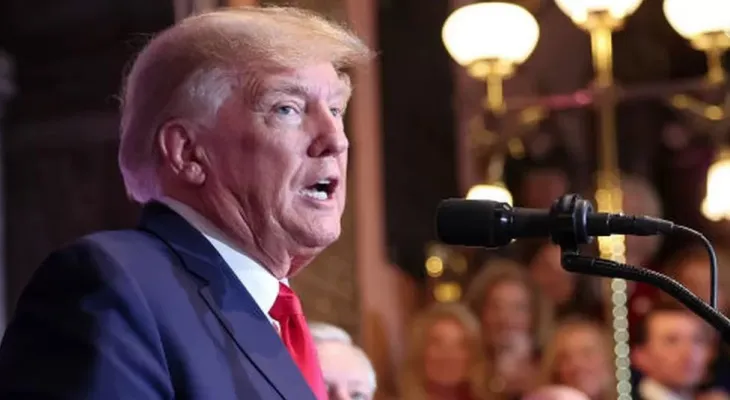Search here
Newspaper
Search here

Arab Canada News
News

Published: January 10, 2024
America follows the principle that everyone is innocent until proven guilty, or at least, that is what has been heard since childhood.
Many people – especially Democrats and left-leaning individuals – want to prevent former US President Donald Trump from reaching the presidential primary elections, under Section Three of the Fourteenth Amendment to the Elections Act, according to a report by the American newspaper "Los Angeles Times," prepared by political writer George Skelton.
Section Three, which was written immediately after the Civil War, states that "no person... shall hold any office, civil or military, under the United States or any state "who has sworn to support the Constitution," and "engaged in insurrection or rebellion," or "gave aid or comfort to the enemies."
This makes perfect sense, according to the newspaper. If one fights to destroy the nation after pledging to protect it, they should not be allowed to help lead the country once they fail to do so.
There is currently a movement aimed at preventing Trump from running again for the presidency, due to allegations that he inspired – to "participate in" – an insurrection carried out by thugs and armed rabble who stormed the United States Capitol building on January 6, 2021, after Trump's enthusiastic speech, and tried to prevent Congress from certifying President Joe Biden's victory in the election over the losing opponent who lied about vote rigging.
Meanwhile, the two liberal Democrats, California Governor Gavin Newsom and the state's Secretary of State Shirley Weber – California's top election official – have not joined the camp calling to prevent Trump from reaching the elections.
Newsom said in his only public comment on the matter: "There is no doubt that Donald Trump poses a threat to our freedoms, and even to our democracy, but here in California, we defeat candidates we don't like at the ballot box... anything else would be a political distraction."
Weber included Trump among the Republican presidential primary candidates, despite pressure from California Democratic Lieutenant Governor Eleni Kounalakis to prevent him from running.
Weber affirmed in a statement: "I must place the sanctity of these elections above partisan politics."
The election official added that "while we can agree that the attack on the Capitol building, and former president’s behavior, were ugly, there are complex legal issues surrounding this matter," explaining that Trump's behavior is "flawed and continues to sow public distrust in government and the legitimacy of elections, so securing elections in a way that transcends political divisions is more important than ever."
Skelton says: "From my point of view, the nation – and certainly democracy – would be much better off if Trump were not allowed near power again. He is dangerously divisive, flagrantly unethical, and a bad role model for the nation's youth."
He added: "Well, Trump has not been convicted of insurrection. Nor has any prosecutor charged him with that, although he has faced nearly 100 other criminal charges."
Skelton asked: "Where are the legal procedures guaranteed by the Constitution? The right to trial by jury? Cross-examining prosecution witnesses? And what exactly is 'insurrection'? It's better to have a fixed definition (of insurrection) before depriving someone of candidacy for public office because they /participated/ in it."
He added: "I contacted some legal scholars and they all told me that apparently it is not necessary to be convicted of the charge of rebellion to keep Trump off the ballot."
For his part, Erwin Chemerinsky, dean of the law school at the University of California, Berkeley, said: "There is nothing in Section Three of the Fourteenth Amendment that requires a conviction."
Jessica Levinson, an election law expert at Loyola Law School, said: "I do not see that Section Three requires the conviction of anyone."
Richard Hasen, a professor of election law at the University of California, Los Angeles, explained that disqualifying someone from the ballot "is not a criminal penalty... it is not imprisonment, not a fine, not a deprivation of a right."
Skelton explained that candidacy for office is not a "right," according to what the professors told me, but rather a "privilege."
Hasen added: "However, there is the issue of due process."
In this context, Skelton explained: "Weber told me that she concluded that keeping Trump off the California ballot is beyond her authority... and added that if she did so, /it would only strengthen the position of those/ who already believe that there is vote rigging against Trump. /And this would only fan the flames/."
Skelton believes: "Even a troublesome person like Donald Trump deserves a fair chance. He should not be punished before being convicted."
Comments